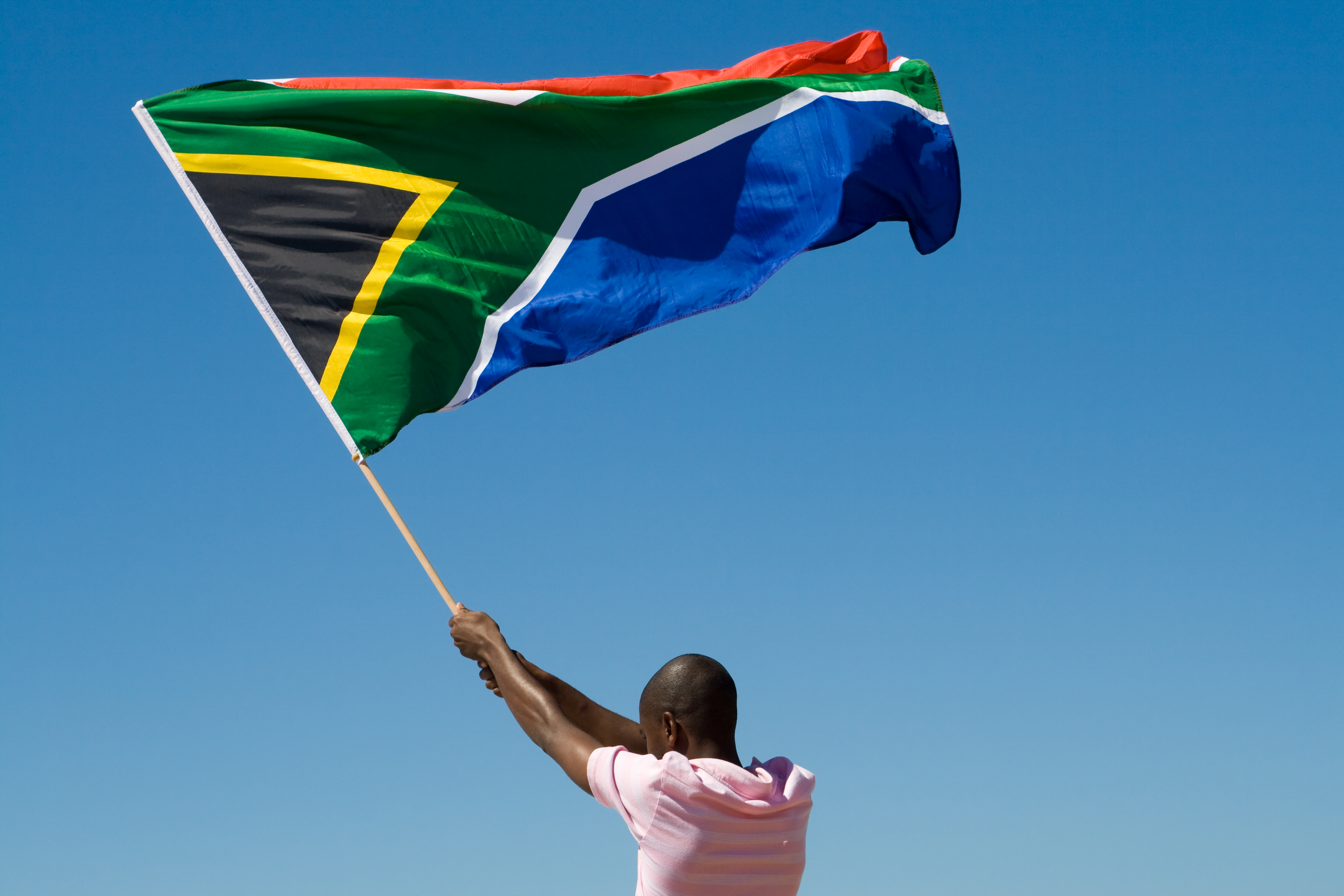South Africa
Review of the first 100 Days of the Government of National Unity

A person waving a South African flag against blue sky
© ShutterstockFor the first time in 25 years, South Africa is once again governed by a coalition. The two strongest parties in this coalition are the African National Congress (ANC) with 159 seats and the liberal Democratic Alliance (DA) with 87 seats. After the first 100 days of this government, it is time to take stock and assess what lessons can be learnt from this coalition for South Africa and what changes it has brought so far.
An increased international cooperation
To address national challenges, ministries are increasingly relying on international collaboration. The Minister for Basic Education, Dr. Siwiwe Gwarube (DA), has engaged with key international partners such as the EU, OECD, and UNICEF to secure support and coordinate national education strategies. Another example is the statement of intent signed by Infrastructure Minister Dean Macpherson (DA) with two Chinese construction companies, which, while raising some concerns in Western circles, represents an effort to improve national infrastructure through global partnerships.
A Strengthened Fight Against Corruption
The new government has made a clear commitment to curbing corruption and managing taxpayer money with greater transparency and responsibility. For example, Infrastructure Minister Dean Macpherson (DA) is currently investigating the loss of 15 million euros, which occurred under his predecessor due to cyberattacks on the ministry. Similarly, Deputy Minister of Higher Education Mimmy Gondwe (DA) has ordered the repayment of 5.7 million euros in improperly disbursed student grants. These funds were allocated based on subjective preferences rather than objective criteria, almost arbitrarily. Gondwe now faces the challenge of restoring the integrity of this funding system and implementing the necessary reforms.
Additionally, Minister for Home Affairs Leon Schreiber has taken steps to combat ID fraud by requiring individuals with blocked IDs to submit written justifications within 30 days as to why their IDs should not be canceled. This initiative seeks to resolve the long-standing issue of wrongfully blocked IDs while reducing the number of fraudulent documents in circulation. Across various ministries, there is a clear push toward greater transparency and accountability. Across various ministries, there is a clear trend toward addressing corruption. This shift is likely influenced by the fact that the ANC no longer governs alone and is under pressure from coalition partners to operate more transparently. Additionally, the long-term efforts of civil organisations, such as the Friedrich Naumann Foundation (FNF), and their anti-corruption projects are now paying off.
Boosting the Economy
Since 1994, unemployment in South Africa has surged from 20% to 42%, pressing the new government to reverse this trend. To boost the labour market, Home Affairs Minister Leon Schreiber (DA) simplified transitions for ZEP holders to general work visas and plans to expedite visa and work permit processes with a points-based system. These reforms are crucial as the ministry faces a backlog of lawsuits due to the inefficiency of his predecessor and many Zimbabwean migrant workers await permit renewals. The progress in this area can also be seen as a success of the partnership between the Helen Suzman Foundation (HSF) and the Friedrich Naumann Foundation (FNF), which successfully sued former Home Affairs Minister Aaron Motsoaledi (ANC) for terminating the Zimbabwean Exemption Permit (ZEP).
In addition to addressing immigration and labor issues, Infrastructure Minister Dean Macpherson (DA) also plans to increase infrastructure investment to 10% of GDP by 2030. Moreover, he rules out any cooperation with the so-called "construction mafia," which has been stalling infrastructure projects in South Africa for years by using violence to secure public contracts that they are unable to fulfill.
Another key element of the new government's economic plan is the support of small and medium-sized businesses. President Cyril Ramaphosa (ANC) recently signed the National Small Enterprise Amendment Bill into law, making it easier for small businesses to access government support. This move has been welcomed by civil organisations such as the FNF, which, in cooperation with GreenCape, fosters the creation of startups.
Increasing Digitalisation
The introduction of a "digital-first" approach by Home Affairs Minister Leon Schreiber is a significant step toward improving the ministry’s efficiency. This reform has already resulted in the processing of 60,582 ZEP applications, reducing the backlog considerably. In addition, Minister for Communications and Digital Technologies Solly Malatsi has emphasised the need to integrate core government systems to ensure a seamless flow of data between departments, further enhancing the efficiency of public administration.
Addressing the Energy Crisis
South Africa has faced daily power outages for years, severely impacting daily life and economic potential. Although there have been officially no outages for 100 days, Energy Minister Kgosientsho Ramokgopa (ANC) warns that the issues are far from resolved and further outages are likely.
A major issue is that 85% of South Africa's electricity comes from ageing coal plants, despite its strong solar potential. South Africa averages 3,254 sunshine hours per year but generates only 2.4% of its electricity from solar energy. In contrast, Germany, with just 1,573 sunshine hours annually, produced 12% of its electricity from solar in early 2024. To address this, Deputy Energy Minister Samantha Grahams (DA), Environment Minister Dion George (DA), and Deputy Economic Minister Andrew Whitfield (DA) aim to diversify the energy mix by expanding renewable energy and privatising the sector.
Overall, the new government demonstrates a strong willingness to reform. However, given the fact that the ANC has been in power for 30 years without succeeding to achieve lasting prosperity for South Africa, one can deduct that the improvements are largely driven by the DA.

